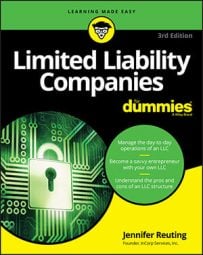An LLC can be formed in any state you wish, but if your LLC conducts business elsewhere, it must register to transact business in those states.
“Conducting business,” refers to serious business, such as hiring employees and leasing office space. Simply selling your products or services to folks in a certain state doesn’t count.
Registering your company to transact business in a state other than its domicile is often referred to as qualifying or foreign filing. When an LLC foreign files in another state, it becomes subject to the laws, taxes, and disclosure requirements of that state.
For instance, if you form your LLC in Nevada in order to keep the ownership of the company completely private and then register to transact business in Arizona, then you would most likely need to disclose the membership of your LLC, just as local companies are required to do.
Problems such as these can reduce or eliminate many of the benefits that motivated you to form your LLC out of state in the first place!
Determining whether you are transacting business
So what exactly constitutes “transacting business”? Well, the states purposefully remain vague in their definitions. Case law and attorney general opinions hold a lot of weight, but you can’t be expected to sift through all those stacks of legal history, now can you?
Check out this website containing all state laws on naming requirements regarding business entities, real estate, and taxation. Enter the password onesmartdummy. Here, you can view your specific state’s laws, organized by topic.
Regardless, if you’re in any way confused about whether your company is considered to be “transacting business” in a particular state, don’t bother calling the secretary of state’s office and asking. If the administrator you speak to does venture to guess, the answer will almost invariably be yes. So take an hour or so and read up on your state’s laws.
If you’re opening up a brick-and-mortar business that operates in only one state — for example, a local shop that deals heavily in a particular community — make it easy on yourself and keep your LLC close to home.
Sometimes a business is viable only if it’s in close proximity to interested customers, resources, and/or land, such as your local dry cleaner or an oil well. Running this type of hands-on, locally based company means that you have to register to transact business in the state in which your business (and you!) resides and abide by its laws.
You may as well save on filing fees and paperwork hassles by keeping everything local from the get-go.
Sticking with pass-through taxation
If you want to take advantage of the favorable tax laws of a specific state, you won’t be able to do so and be taxed as a partnership. With partnership taxation, the revenue and expenses (and the resulting profit or loss) of the business flow through to you and the other owners, to be reported on your individual personal tax returns, and you pay personal income taxes on that profit in whatever state(s) you reside in.
This process eliminates any tax savings you may have gotten by forming your LLC in a low-tax or no-tax state (often referred to as a tax haven). Same goes for other forms of pass-through taxation, such as being taxed as a sole proprietor (which the IRS refers to as a disregarded entity) or an S corporation.
A corporation, on the other hand, is considered a legal entity unto itself and is taxed separately. Unless a company is legally transacting business in another state and is required to register there, whatever profit the company makes remains in the corporation, and thus in the state in which the corporation was formed.
This profit is subject to any corporate income tax that its home state — its domicile — levies on it. In short, any LLC formed in another state for the specific purpose of reducing state income tax must elect corporate taxation in order for the strategy to be feasible.

